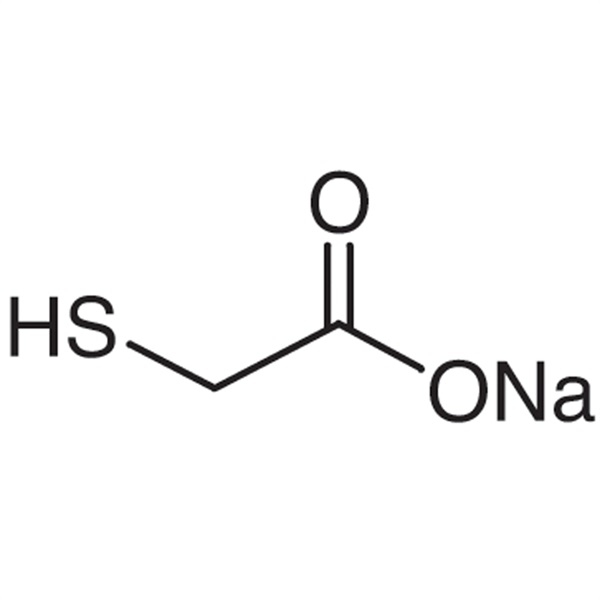Chemical Properties:
Package: Bottle, Aluminium foil bag, 25kg/Cardboard Drum, or according to customer's requirement Storage Condition: Store in sealed containers at cool and dry place; Protect from light and moistureShanghai Ruifu Chemical Co., Ltd. is the leading manufacturer and supplier of Sodium Thioglycolate (CAS: 367-51-1) with high quality. We can provide COA, worldwide delivery, small and bulk quantities available. Please contact: alvin@ruifuchem.com| Item | Specifications |
| Appearance | White to Off-White Powder |
| Infrared Spectrum | Conforms to Structure |
| Purity / Analysis Method | ≥99.0% (Iodometric Titration) |
| Sensitiveness Test | Pass |
| Solubility in H2O | Clear Colorless to Pink or Faint Purple, 200 mg/mL Pass |
| Test Standard | Enterprise Standard |
| Usage | Pharmaceutical Intermediates |
Description:
Specifications:
Package & Storage:
| Chemical Name | Sodium Thioglycolate |
| Synonyms | Mercaptoacetic Acid Sodium Salt; Sodium Mercaptoacetate; Thioglycolic Acid Sodium Salt |
| CAS Number | 367-51-1 |
| CAT Number | RF-PI2088 |
| Stock Status | In Stock, Production Scale Up to Tons |
| Molecular Formula | C2H3NaO2S |
| Molecular Weight | 114.10 |
| Melting Point | >300℃(lit.) |
| Density | 1.311 |
| Water Solubility | Soluble in Water |
| Sensitivity | Air, Moisture and Heat Sensitive, Hygroscopic |
| Storage Temp. | Store at -20℃, Argon Charged |
| Brand | Ruifu Chemical |
Advantages:
FAQ:
Application:
Sodium Thioglycolate (CAS: 367-51-1) is mainly used as inhibitor of copper molybdenum minerals and pyrite. It is an effective inhibitor for realizing cyanide-free flotation of molybdenite, which can replace (highly toxic) and sodium sulfide, and selectively inhibits copper and sulfur coexisting with molybdenite, especially for copper sulfide and pyrite Inhibition is obvious. A disulfide reducing agent. Sodium thioglycolate has been used: as a growth supplement in enrichment media and to study its effect on Arcobacter; in influenza hemagglutinin formulation in order to reduce disulfide-mediated cross-linking and early potency loss; in electron microscopy.


